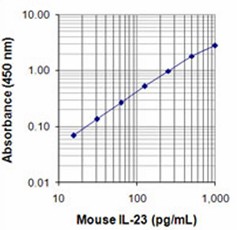- Regulatory Status
- RUO
- Other Names
- Interleukin 23 (Interleukin 23, alpha subunit p19 and Interleukin-12 subunit beta p40)
- Ave. Rating
- Submit a Review
- Product Citations
- publications

| Cat # | Size | Price | Quantity Check Availability | Save | ||
|---|---|---|---|---|---|---|
| 589009 | 4 pack | $94 | ||||
IL-23 is a member of the IL-6 family of cytokines, and it is constituted by two subunits, p19 and p40. The p19-p40 heterodimer is stabilized by a disulfide bond. The subunit p40 is shared by IL-23 and IL-12 cytokines. p19 mRNA is expressed in endothelial cells and polarized T cells; nevertheless, p40 is not expressed by these cells. Therefore, the availability of functional IL-23 is limited by the expression of p40, and not p19. IL-23 exerts its biological activities through the interaction with a heterodimeric receptor complex composed of IL-12Rb1 and IL-23R. IL-23 activates Janus kinase (JAK)/signal transducer and activator of transcription signaling molecules (STAT). JAK2 is constitutively associated with the IL-23R chain, and binding of IL-23 to its receptor leads to phosphorylation of STAT1, STAT3, STAT4, and STAT5.
Product DetailsProduct Details
- Source
- The mouse IL-23 consists of two subunits linked via a disulphide bond: P19, (Accession# NM_031252: Met1-Ala196), and P40, (Accession# NM_008352: Met Met1-Ser335). Mouse IL-23 was expressed in insect cells.
- Molecular Mass
- The total predicted molecular weight is 55.4 kD. The non-reduced protein migrates at approximately 60 kD and the DTT-reduced protein produces two bands at approximately 19 kD (Leu20-Ala196) and 40 kD (Met23-Ser335) by SDS-PAGE.
- Purity
- >98%, as determined by Coomassie stained SDS-PAGE.
- Formulation
- Lyophilized in sterile-filtered PBS, pH 7.2, containing 1% BSA and 0.09% sodium azide.
- Concentration
- Lot-specific (to obtain lot-specific concentration and expiration, please enter the lot number in our Certificate of Analysis online tool.)
- Storage & Handling
- Unopened vials can be stored between 2°C and 8°C until the expiration date. Prior to use, reconstitute the lyophilized powder with 0.2 mL of PBS containing a carrier protein (e.g., 1% BSA, protease free), pH7.4. Re-cap vial, vortex. Allow the reconstituted standard to sit at room temperature for 15 minutes, vortex again to mix completely. The reconstituted standard stock solution can be aliquoted into polypropylene vials and stored at -70°C for up to one month. Do not re-use diluted standards. Avoid repeated freeze/thaw cycles.
- Application
-
ELISA - Quality tested
- Recommended Usage
-
Each lot of this protein is quality control tested by ELISA assay. For use as an ELISA standard, a standard curve comprised of doubling dilutions from 1000 pg/ml to 15.6 pg/ml is suggested. It is recommended that the reagent be titrated for optimal performance for each application.
- Application Notes
-
This IL-23 protein is useful as a standard for a mouse IL-23 sandwich ELISA, using purified (clone MMp19B2) antibody (Cat. No. 513802) for capture and biotinylated (clone C17.8) antibody (Cat. No. 505302) for detection.
Antigen Details
- Structure
- Heterodimer.
- Distribution
-
IL-23 is highly expressed by activated dendritic cells, macrophages, and epidermal Langerhans cells.
- Interaction
- Memory T cells, Th17 cells, inflammatory macrophages, natural killer (NK) cells, dendritic cells (DCs), and monocytes.
- Ligand/Receptor
- IL-23 binds to L-12Rb1 and IL-23R.
- Biology Area
- Immunology, Stem Cells
- Molecular Family
- Cytokines/Chemokines
- Antigen References
-
1. Oppmann B, et al. 2000. Immunity 13:715.
2. Aggarwal S, et al. 2003. J. Biol. Chem. 278:1910.
3. Piskin G, et al. 2006. J. Immunol. 3:1908-15.
4. Ivanov II, et al. 2006. Cell 126:1121.
5. McGeachy MJ, et al. 2007. Nat. Immunol. 8:1390.
6. Wilson NJ, et al. 2007. Nat. Immunol. 8:950.
7. Boniface K, et al. 2008. Immunol. Rev. 226:132-46.
8. Chizzolini C, et al. 2008. Blood 112:3696.
9. Buonocore S, et al. 2010. Nature 464:1371. - Gene ID
- 16160 View all products for this Gene ID 83430 View all products for this Gene ID
- UniProt
- View information about IL-23 on UniProt.org
 Login/Register
Login/Register 
















Follow Us